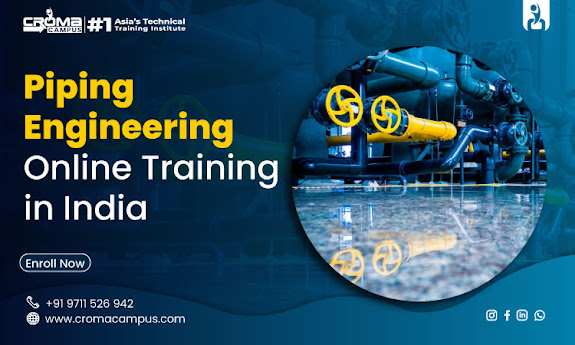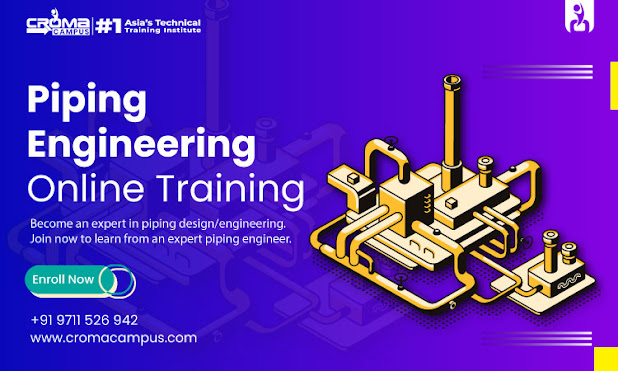Is Piping Engineering a growing career?
Introduction
In the vast field of engineering, where various
disciplines compete for attention, piping engineering stands out as a blooming
and promising career path. These engineers play a vital role in designing,
constructing, and maintaining complex piping systems that facilitate the
transportation of fluids and gases. With the constant evolution of industries
such as oil and gas, power generation, and manufacturing, the demand for
skilled piping engineers is on the rise. And probably that’s why there’s a huge
demand in the enrolment of by candidates coming from numerous fields.
In this article, we explore the reasons why piping
engineering is a flourishing career choice and the opportunities it offers to
aspiring engineers.
List the reasons to know why Piping Engineering is booming
·
Expanding Industries and Infrastructural
Development
As global industries continue to grow and expand, the
need for efficient and reliable piping systems becomes paramount. Industries
such as oil and gas, petrochemicals, pharmaceuticals, and food processing
require intricate piping networks to transport raw materials, fluids, and gases
across their facilities. Furthermore, the development of new power plants,
refineries, and manufacturing units worldwide necessitates the expertise of
piping engineers to ensure seamless operations. The increasing energy demand,
coupled with the need for infrastructure development, creates a favourable
environment for aspiring piping engineers.
·
Crucial Role in System Design and
Optimization
Well, they are responsible for designing and optimizing complex piping systems. They ensure the safe and efficient transport of fluids, taking into account factors such as pressure, temperature, flow rates, and material compatibility. By employing advanced software tools and simulation techniques, piping engineers can model and analyze piping systems, identifying potential bottlenecks, pressure drops, or fluid losses. Their expertise is crucial in achieving optimal system performance, reducing energy consumption, and maximizing operational efficiency.
·
Integration of Advanced Technologies
The field of piping engineering has witnessed a rapid integration of advanced technologies in recent years. With the advent of computer-aided design (CAD) and 3D modelling software, piping engineers can create highly detailed designs, accurately visualize piping layouts, and detect clashes or interferences before construction begins. Additionally, advancements in materials science have led to the development of high-performance piping materials, enhancing system reliability and longevity. Piping engineers must stay updated with these technological advancements and possess the skills to leverage them effectively.
·
Global Opportunities and Career
Progression
In a way, it offers a wide range of global opportunities. As large-scale industrial projects emerge across the globe, skilled piping engineers are in high demand, particularly in regions experiencing rapid industrialization. Whether it's working on offshore oil rigs, constructing gas pipelines, or designing intricate systems for mega-projects, such as power plants or refineries, piping engineers have a diverse range of career options. Moreover, as experienced professionals, they can progress to managerial or leadership roles, overseeing projects, coordinating teams, and contributing to strategic decision-making.
·
Job Security and Competitive
Compensation
Given the critical role they play in various industries,
piping engineers enjoy a high level of job security. The demand for their
expertise ensures a steady stream of employment opportunities. Furthermore, the
specialized knowledge and skills possessed by piping engineers make them highly
sought after, leading to competitive compensation packages. Their salaries
often reflect their level of experience, the complexity of the projects they
handle, and the industry they work in. In fact, they are well-positioned to
enjoy a stable and rewarding career.
Conclusion
The information listed above conveys that Piping Engineering
presents a flourishing and prosperous career path for aspiring engineers. Over
the past few years, the expanding industries, infrastructural development, and
integration of advanced technologies create a favourable environment for piping
engineers to thrive. The critical role they play in system design,
optimization, and the efficient transportation of fluids ensures their
relevance in various industries. With global opportunities, career progression,
job security, and competitive compensation, piping engineering offers a
promising future for those who are passionate about creating robust and
efficient piping systems. Aspiring engineers looking for a challenging and
rewarding career should consider getting associated with a legit Piping
Engineering Training Institute in Delhi
to know its minute details. This way, you will end up knowing every minute detail
in a much better manner.



Comments
Post a Comment